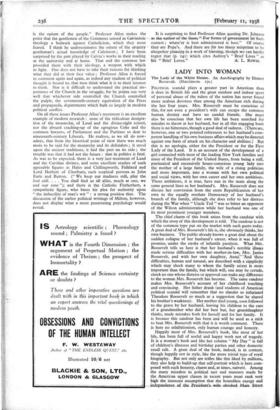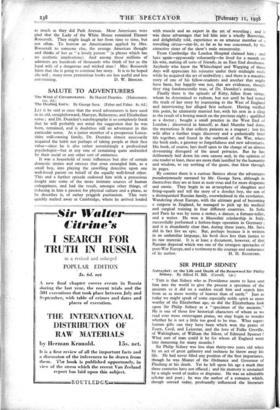LADY INTO WOMAN
The Lady of the White "Houhe. An Autobiography by Eleanor Roosevelt. (Hutchinson. 155.)
POLITICAL scandal plays a greater part in American than it does in British life and the great outdoor and indoor sport of personal abuse of the rulers of the nation has never found more zealous devotees than among the American rich during the last Tour years. Mrs. ROoseVelt must be conscious of this, for not even a president's wife can escape the common human destiny , and have no candid friends. She must also be conscious that her own life has been searched for missiles to throw at her husband, but in all this engaging book there is no bitterness, though a good deal of sadness. (There are, however, one or two pointed references to her husband's com- petent handling of his own business affairs which may be directed against one form of attack on his character and abilities.) But this is no apologia, either for the President or for the First Lady of the Land. It is an account of the development of a girl connected with most of the leading New York families and niece of the President of the United States, from being a stiff, puritanical and excessively house-conscious young lady into the mother of a large family, the wife of a rising politician and more important, into a woman with her own political and social views, with her own career and her own ambitions. Those ambitions, it is true, have run in the main along the same general lines as her husband's. Mrs. Roosevelt does not discuss her conversion from the stern Republicanism of her own to the equally resolute Democracy of her husband's branch of the family, although she does refer to her distress during the War when " Uncle Ted " was so bitter an opponent of the Wilson administration while her husband was one of its most prominent younger members.
The chief charm of this book arises from the canddur with which the story of this development is told. The candour is not of the common type put on the market with such gusto today. A great deal of Mrs. Roosevelt's life is, she obviously thinks, her own business. The public already knows a great deal about the sudden collapse of her husband's career, when it was full of promise, under the stroke of infantile paralysis. What Mis. Roosevelt tells us here is that her husband's terrible illner,s made serious difficulties with her mother-in-law, Mrs. James Roosevelt, and with' her own danghter; Atuais:'"And -these difficulties, human and natural, are described with a simplicily which may shock many to whom the family secret is Incite important than the family, but which will, one may be certain, shock no one whose distress or approval can make any dilfere4e to the woman Mrs. Roosevelt has become. The same candour makes Mrs. Roosevelt's account of her childhood touching and convincing. Her father drank (and students of American political scandal will remember that no slander so infuriated Theodore Roosevelt so much as a suggestion that he shared his brother's weakness). Her mother died young, soon followed to the grave by her husband, leaving his children. to the care of a grandmother who did her best but, her granddaughter thinks, made mistakes both for herself and for her family. It is because this candour has been and will be used as a stick to beat Mrs. Roosevelt with that it is worth comment. There is here no exhibitionism, only human courage and honesty.
Happily most of Mrs. Roosevelt's book, like most of her life, has been full of useful and happy work not of tragedy. It is a woman's book and like her column " My Day " is full of children's illnesses and birthday parties and other domestic small talk. A great . deal of the book, indeed, is in content, though happily not in style, like the more trivial type of royal biography. But not only,are trifles like this liked by millions, they also help to build-up that self-portrait which is here com- posed with such honesty, charm and, at times, naivete. Among the many mistakes in political tact' and manners made by
the American upper classes in recent years must rank very high the innocent assumption that the boundless energy and -independenceof -the-Bresidenea-wife-sitocked---Main, Stxeet- as much as they did Park Avenue. Most Americans were glad that the Lady of the White House -remained. Eleanor Roosevelt. They might laugh at her from time to time, but not often. To borrow an Americanism applied by Mrs. Roosevelt to someone else, the average American thought and thinks of her as " a lovely person " (a phrase which has no aesthetic implications). And among these. millions of admirers are hundreds of thousands who think of, her an the • loyal wife of a dangerous and wicked man ! Mrs Roosevelt hints that she is going to continue her story. It is to be hoped she will ; many more pretentious books are less useful and less



















































 Previous page
Previous page